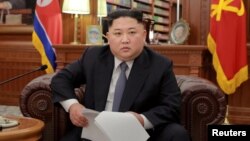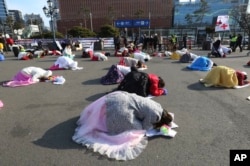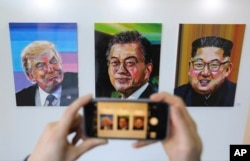North Korean leader Kim Jong Un highlighted peace and prosperity in his annual New Year’s address, and while he did not make the much-anticipated trip to Seoul in 2018, some local residents are hopeful the visit could still come soon and promote greater ties between the two nations.
Kim Soo-keun, a member of the “Welcoming Committee of the Great Man” group, told VOA that members of the government and South Korean citizens should work together to promote better ties and unification.
“We have witnessed the warmest welcome in Pyongyang and we should do the same to the visitors from the north,” Kim Soo-geun said.
Speaking during his New Year’s Day address, North Korean leader Kim Jong Un said, “North and South should not pass up the favorable atmosphere of today when all the nationals’ interest in and aspiration for reunification are growing unprecedentedly, but actively try to find a peaceful reunification plan based on nationwide agreement and direct sincere efforts to this end.”
In a letter to South Korean President Moon Jae-in before 2018’s end, Kim “expressed a strong determination to visit Seoul,” Moon’s spokesman, Kim Eui-kyeom, told reporters.
Kim also conveyed to Moon “an intention to meet with Moon frequently in 2019” to pursue peace and “solve the issue of denuclearizing the peninsula together,” spokesman Kim said.
Multiple groups seek to welcome Kim
In addition to the “Welcoming Committee of the Great Man” group, two other organizations have been active in the Seoul area, promoting a warm reception for the North Korean leader.
While the “Seoul Citizen Welcome Committee” and “Baekdu Guard” initially held a number of events and rallies throughout the city, both have scaled back their activities.
On its Facebook and web page, the “Seoul Citizen Welcome Committee” encourages residents to fill out postcards to Kim Jong Un. According to a counter on its homepage, they’ve collected just more than 6,000 in a city of millions.
As the likelihood of Kim’s visit to Seoul abated in late 2018, the “Baekdu Guard” group closed its website, although the organization continues to maintain its Facebook page.
Both the “Seoul Citizen Welcome Committee” and “Baekdu Guard” groups declined to speak with VOA about their activities and goals; however, “Welcoming Committee of the Great Man” said they formed in November to counter “groups that are against the unification, such as far-right conservatives.”
“Welcoming Committee of the Great Man’s” group Kim Soo-keun tells VOA his organization has six core members that aim to provide Kim Jong Un a welcome in Seoul reciprocal to the one Pyongyang gave Moon in September.
A recent Realmeter poll found 61.3 percent of those surveyed would welcome Kim if he comes to the South, noting it would likely contribute to peace on the Korean Peninsula. The survey results indicated 31.3 percent of those questioned opposed the visit.
National Security Law controversy
Since 1948, South Korea’s National Security Law has been in place “to suppress anti-State acts that endanger national security and to ensure the nation’s security, people’s life and freedom.”
In practice, the act made communism illegal and recognized North Korea as a political entity. Organizations advocating the overthrow of the government also run afoul of the statute.
Amnesty International has described the National Security Law as a tool to “ harass and arbitrarily prosecute individuals and civil society organizations who are peacefully exercising their rights to freedom of expression, opinion and association” and to “remove people who are perceived to threaten established political views, to prevent people from taking part in discussions surrounding relations with North Korea.”
Recently, several anti-North Korean groups filed complaints against pro-North Korea activists, including Kim Soo-keun, of breaching the National Security Law.
Speaking to the Korea Times, Park Sang-hak, the founder of the Fighters for a Free North Korea, said, “I respect the pro-North organizations’ thoughts, but it should be expressed within the limits of the constitution.”
Kim Soo-keun counters by saying, “Despite the opposition, if Kim [Jong Un] makes his visit, it means that the old ideologies such as anti-communism, or the National Security Law are not valid in [South] Korea.”
If Kim Jong Un visits Seoul, Kim Soo-keun believes it can “resolve misunderstandings and prejudices” surrounding the Korean leader and people “will think it is not necessary to be hostile to the North, and we can step forward to peace and prosperity.”
Lee Ju-hyun contributed to this report.






